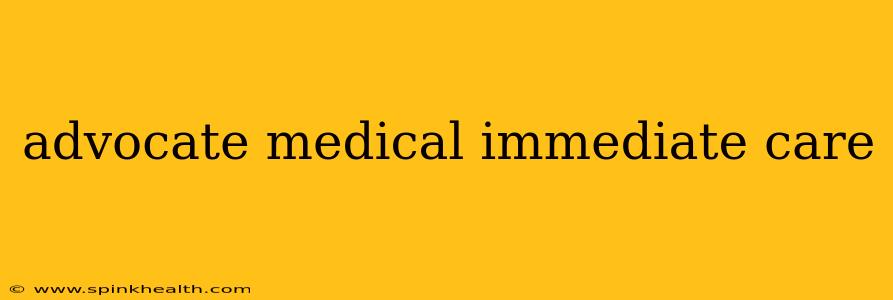When Seconds Count: Why Advocating for Immediate Medical Care Matters
Imagine this: a loved one collapses, clutching their chest, gasping for air. Or perhaps a child falls, hitting their head, and becomes unresponsive. These are moments where every second counts. This isn't about dramatizing emergencies; it's about understanding the critical importance of advocating for immediate medical care. It's about recognizing the signs, knowing when to act, and understanding the life-altering difference timely intervention can make.
This isn't just about dialing 911; it's about a proactive approach to health, a commitment to recognizing symptoms and understanding the nuances of when professional medical intervention is absolutely necessary. It's about becoming a powerful advocate for yourself and your loved ones, ensuring that help arrives swiftly and efficiently when it's most needed.
What are the signs that immediate medical care is needed?
This is perhaps the most crucial question. The symptoms indicating an immediate need for medical attention can vary wildly depending on the situation. However, some common red flags include:
- Sudden, severe chest pain: This could indicate a heart attack, a life-threatening condition requiring immediate medical intervention. Don't wait it out; seek help immediately.
- Difficulty breathing: Shortness of breath, wheezing, or gasping for air can be symptoms of various serious conditions, including asthma attacks, pneumonia, or even a pulmonary embolism. These require urgent medical attention.
- Severe bleeding: Uncontrollable bleeding, especially from a deep wound, can lead to significant blood loss and even death. Immediate medical attention is paramount.
- Loss of consciousness: Any period of unconsciousness requires immediate medical assessment to rule out serious underlying conditions, such as stroke, head injury, or seizure.
- Sudden, severe headache: While headaches are common, a sudden, severe headache, particularly accompanied by other symptoms like numbness, weakness, or vision changes, could signal a stroke or other neurological emergency.
- Signs of stroke (FAST): Remember the acronym FAST: Facial drooping, Arm weakness, Speech difficulty, Time to call 911. Acting quickly can be crucial in limiting the damage caused by a stroke.
- Severe allergic reaction: Symptoms like difficulty breathing, swelling of the face or throat, and hives indicate a severe allergic reaction (anaphylaxis), a life-threatening emergency requiring immediate epinephrine and medical attention.
- Severe abdominal pain: Intense stomach pain, especially if accompanied by vomiting, fever, or bloody stools, can be a sign of a serious condition requiring immediate medical evaluation.
How do I advocate for myself or a loved one in a medical emergency?
Advocating for immediate medical care involves more than just calling emergency services. It's about being prepared, assertive, and clear in communicating the situation.
- Stay calm: While challenging, maintaining a calm demeanor allows for clearer communication with emergency responders and medical professionals.
- Provide accurate information: Clearly and concisely explain the situation, including the symptoms, the person's medical history (if known), and any allergies.
- Follow instructions: Listen carefully to the instructions from emergency personnel and medical professionals and follow them diligently.
- Ask questions: Don't hesitate to ask questions if you are unsure about anything, especially regarding treatment plans or diagnoses.
- Keep detailed records: After the emergency, keep detailed records of the incident, including the symptoms, treatment received, and any follow-up appointments. This will be crucial for future reference.
What if my doctor dismisses my concerns?
Sometimes, despite clear symptoms, a doctor might downplay concerns. In such cases, it's crucial to:
- Seek a second opinion: Don't hesitate to seek advice from another medical professional.
- Document everything: Keep a detailed record of all interactions with healthcare providers, including dates, times, and summaries of conversations.
- Be persistent: Your health is your responsibility. Don't be afraid to advocate for yourself and insist on appropriate testing or treatment.
What are the long-term consequences of delayed medical care?
Delayed medical care can have severe and sometimes irreversible consequences. Conditions like heart attacks, strokes, and severe allergic reactions can lead to permanent disability or even death if not treated promptly. Early intervention significantly improves outcomes and reduces the risk of long-term complications.
In conclusion, advocating for immediate medical care is not simply a matter of convenience; it's a crucial element of responsible healthcare. By understanding the signs of emergencies and knowing how to act decisively, you can make a life-saving difference for yourself and those you care for. It's about being proactive, informed, and assertive in ensuring timely access to essential medical care – because when seconds count, every moment matters.

